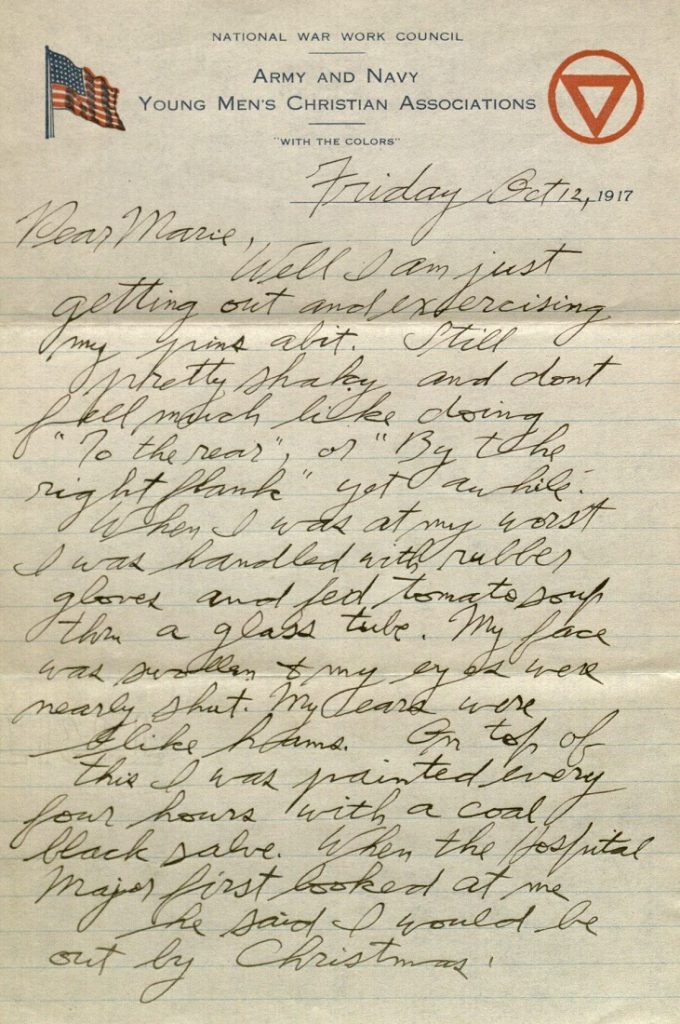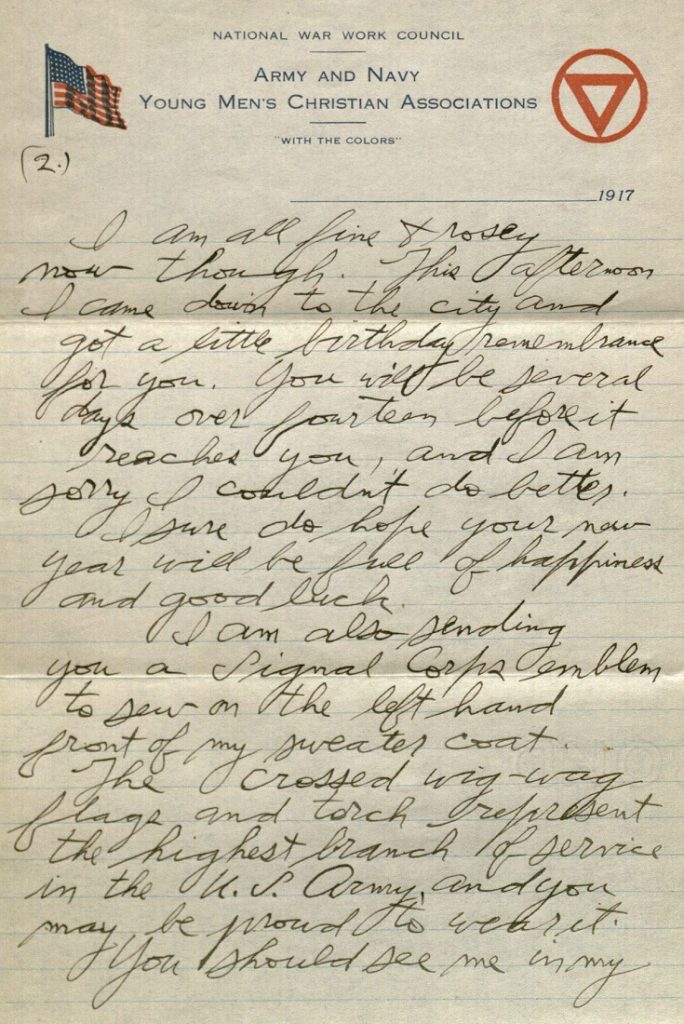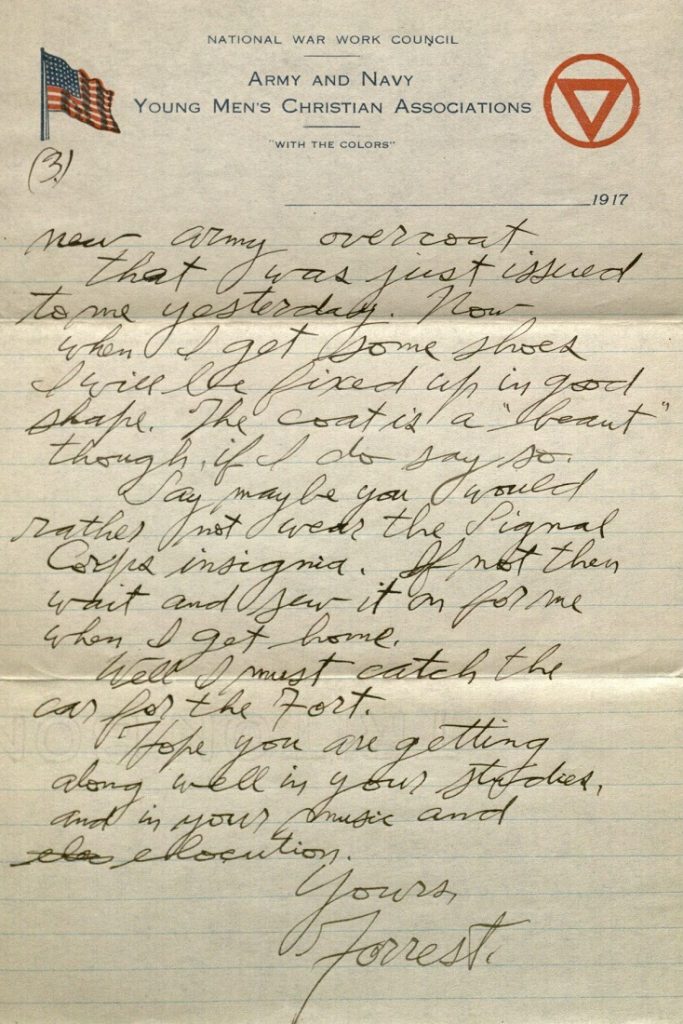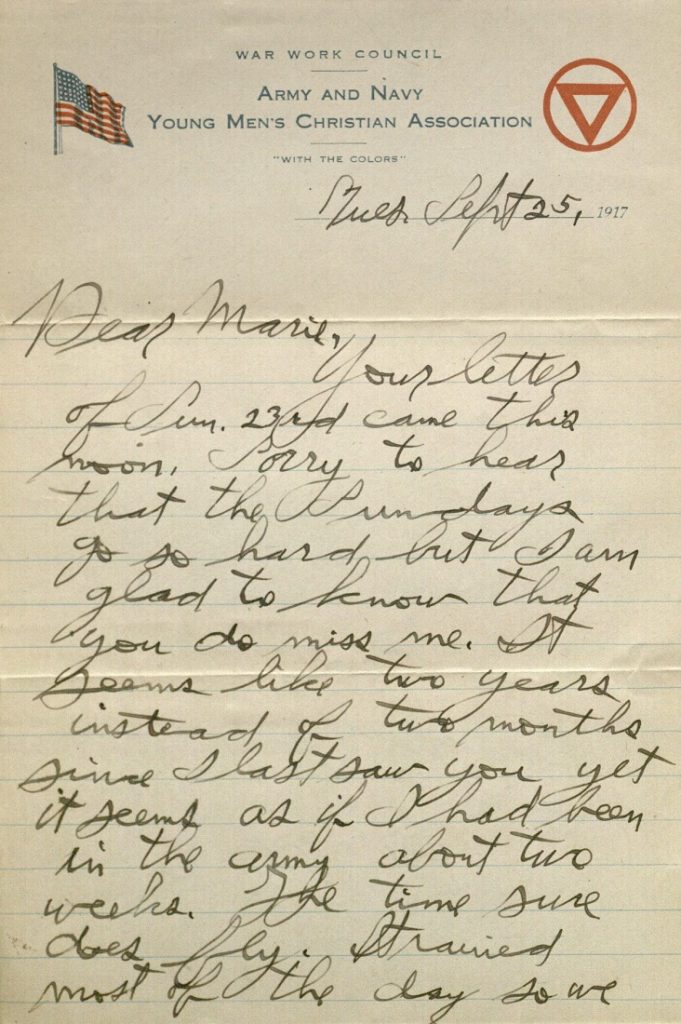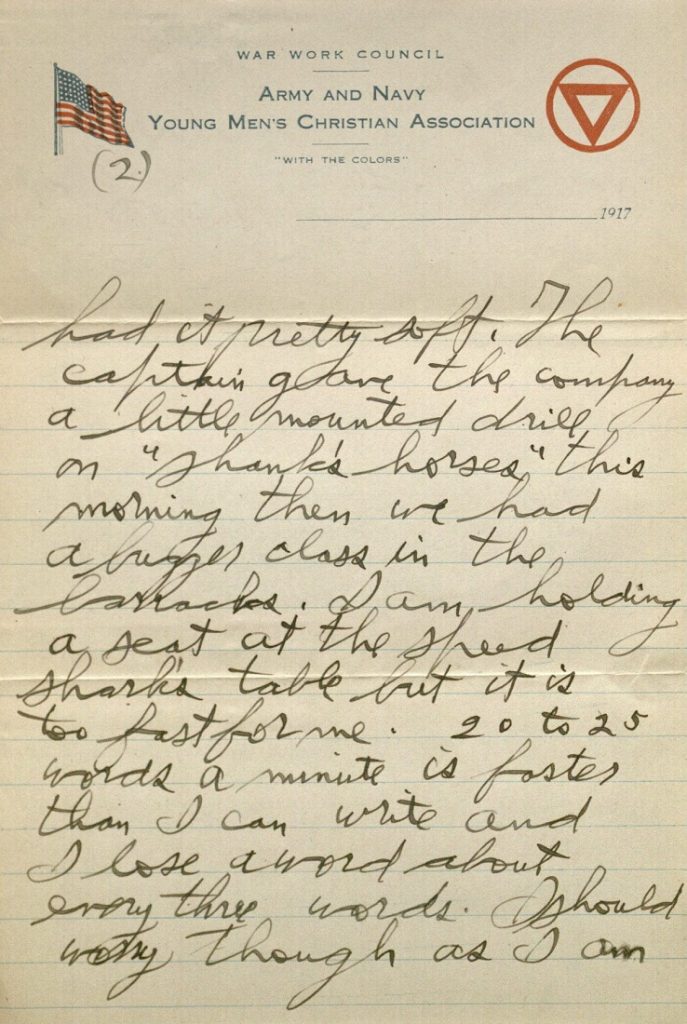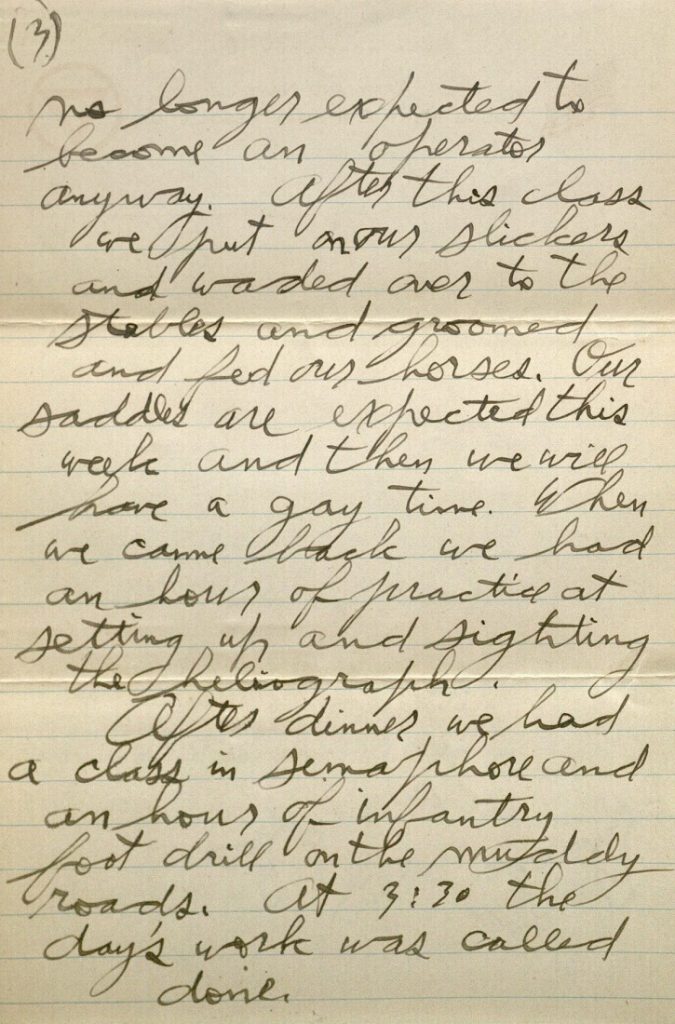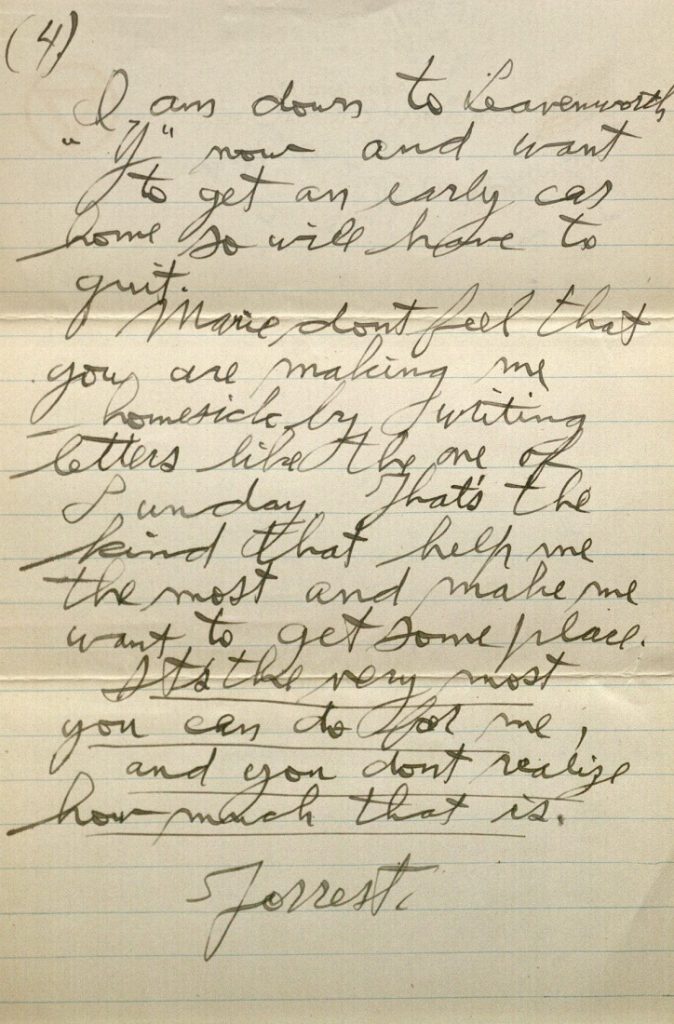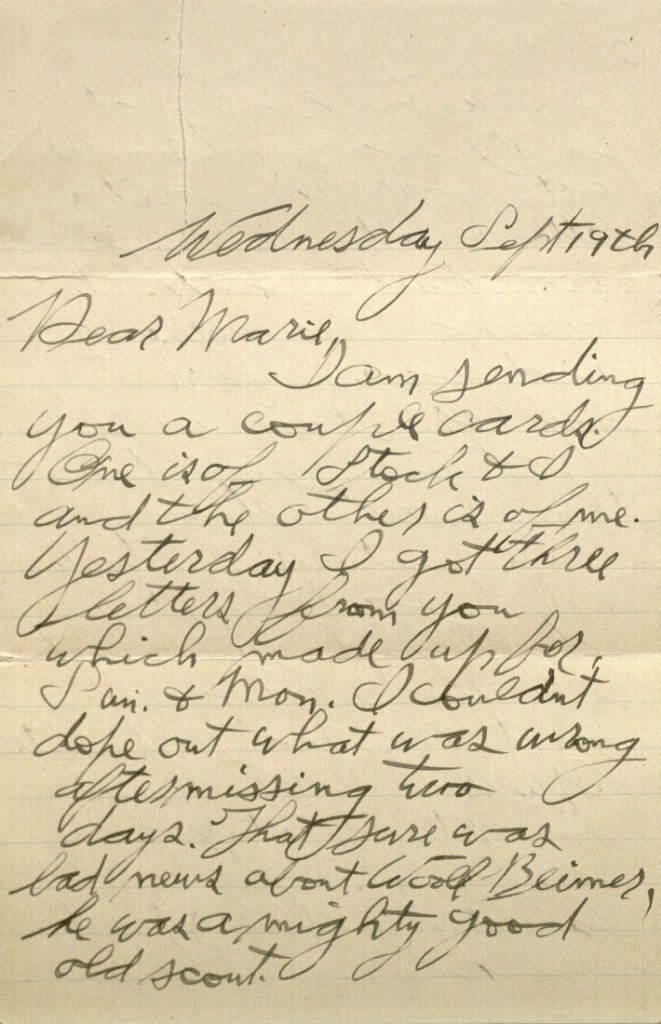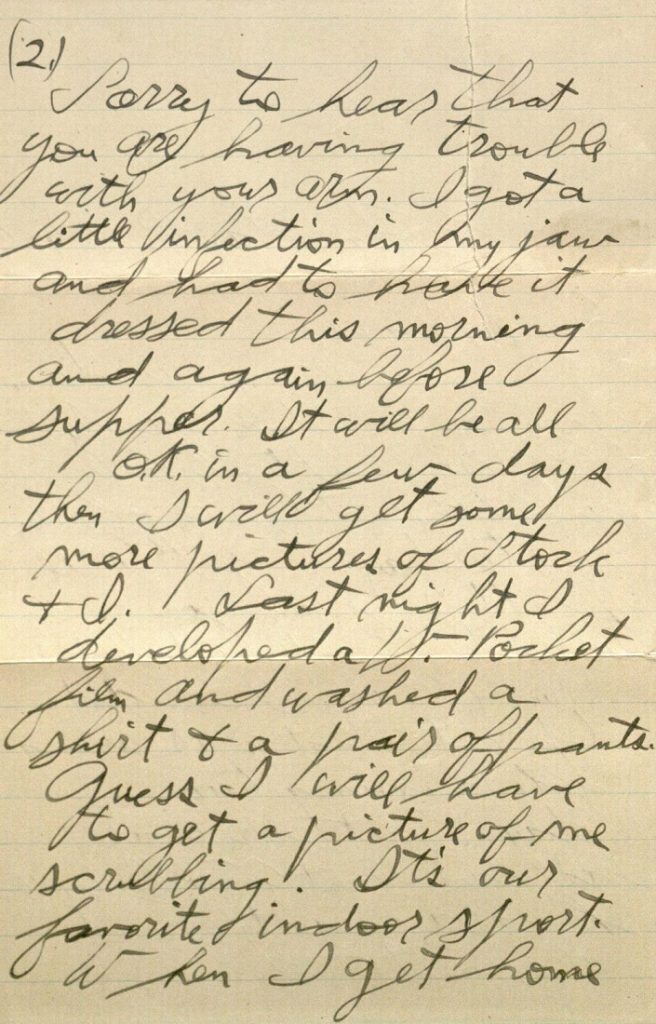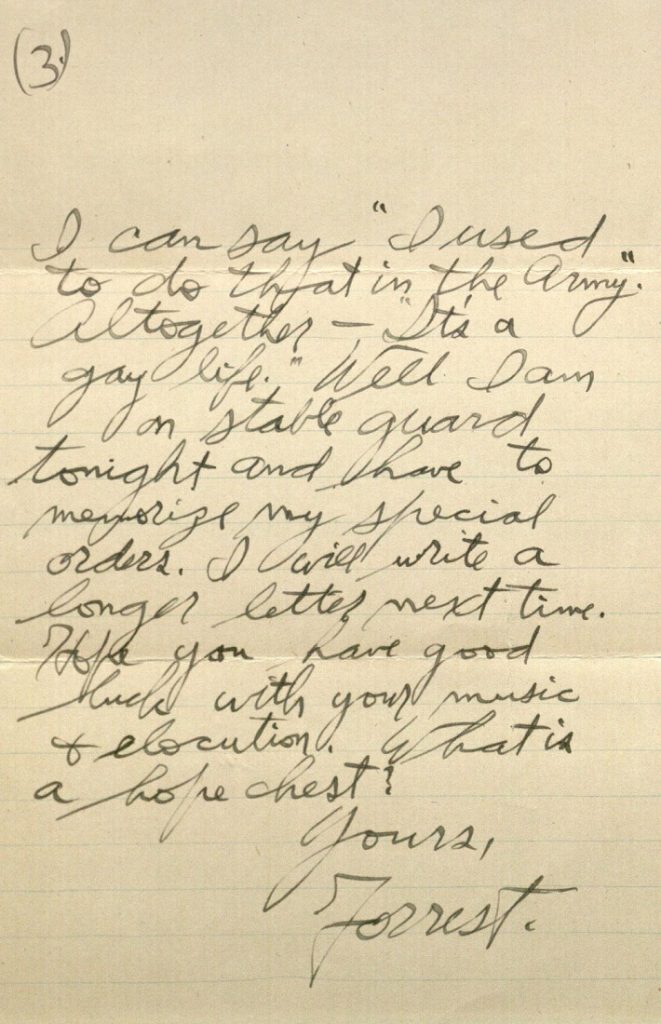In honor of the centennial of World War I, we’re going to follow the experiences of one American soldier: nineteen-year-old Forrest W. Bassett, whose letters are held in Spencer’s Kansas Collection. Each Monday we’ll post a new entry, which will feature selected letters from Forrest to thirteen-year-old Ava Marie Shaw from that following week, one hundred years after he wrote them.
Forrest W. Bassett was born in Beloit, Wisconsin, on December 21, 1897 to Daniel F. and Ida V. Bassett. On July 20, 1917 he was sworn into military service at Jefferson Barracks near St. Louis, Missouri. Soon after, he was transferred to Fort Leavenworth, Kansas, for training as a radio operator in Company A of the U. S. Signal Corps’ 6th Field Battalion.
Ava Marie Shaw was born in Chicago, Illinois, on October 12, 1903 to Robert and Esther Shaw. Both of Marie’s parents – and her three older siblings – were born in Wisconsin. By 1910 the family was living in Woodstock, Illinois, northwest of Chicago. By 1917 they were in Beloit.
Frequently mentioned in the letters are Forrest’s older half-sister Blanche Treadway (born 1883), who had married Arthur Poquette in 1904, and Marie’s older sister Ethel (born 1896).
Highlights from this week’s letters include the arrival of fudge from Marie (“it was the real stuff and tasted great”), Forrest’s accident with a wild horse (“the next thing I knew, I felt something like a good healthy brick on my jaw and I hit the sod like a rock”), and analysis of a hug Forrest shared with Marie before his departure (“if I had thought, when you let me hug you, that you did so without knowing or caring what kind of a boy I was, you never would have made me love and respect you the way I do”). Additionally, Forrest relays some speculation about how long the war will last. On one hand, he opines that “it won’t be long. When I watched the Officers Reserve training at bayonet fighting, I couldn’t help but feel that Uncle Sam is going to hand the Dutch a prize package.” On the other hand, Forrest reports to Marie that “this man, Popelka, says the war is going to last a good two years longer. Somebody is always taking the joy out of life.”
Tues. Sept. 11, 1917
Dear Marie,
The fudge and proofs came O.K. Say you sure had good luck with that batch. It was the real stuff and tasted great. Thankee, come again. I did not like the pictures very well. The expression on your face is too sober for the bright-eyed little girl that I left. Your hair looks fine, I think. In another envelope, I am sending some bum pictures. This sure is some poor work. I am going to develop my films myself after this and send them home to get the prints. I was pretty disappointed in the one of George and I. He has my camera case on his shoulder and is operating the heliograph key. We expect to get paid any day now but there are lots of things we expect, that we don’t get. I got something that I didn’t expect this morning. We were grooming the horses out on the picket chain, and I got a wild one. The first sergeant, O’Brien, warned me to watch his front feet and I was very careful and got one side all brushed up fine, with only a few false motions on the part of the horse. Then Captain Mitchum came and said he wanted the names of all expert and amateur photographers. I left the horse and went over to sign up. When I came back, I stepped up to the front of my horse and just as I got within four or five feet of him, a fellow spoke to me and I turned a little to answer. The next thing I knew, I felt something like a good healthy brick on my jaw and I hit the sod like a rock. A couple fellows picked me up and took me over to the hose and washed the blood and dirt away. My shirt was torn in strips from my shoulder half way down my right side. I went down to the hospital and had the cuts on my jaw dressed and then hit it for the barracks. I didn’t miss a single drill period although my jaw was a little stiff and I had a slight headache. Another fellow was laid low by the same horse, and now no one but Sergeant Gillespie is allowed to groom him. I don’t see how the army can use a saddle horse that is wild enough to plunge at a man and knock him down with his front feet, when he ain’t even within arms reach of him. I think I got out pretty lucky and am thankful that no blame was placed on me, for being careless. We are learning to saddle and mount our horses now. I suppose we will just be learning to ride and then I’ll be transferred Co. A of the 5th Bn. is already having mounted drill but we only have ten saddles for 75 men so only a few of us have ever been on one. Each of us will have a horse when we are in the field except the men who drive the horses on the wagon wireless set in my section. It looks pretty neat to see a company of men ride by with each horse in his proper place in the column. When Captain Mitchum called for photographers, I signed up as an expert. He said “How many years experience?” I said four. Then he asked if I knew anything about color photography. I answered, “Autochrome and Hess-Ives process. He looked as if to say “nuff ced” and put me down as O.K. Believe me one has to be a perfectly good little bluffer in order to push ahead. I am not anxious to leave this outfit though, but the more varied my experience the more I will get out of it. I have qualified in wig-wag and all the General Service code stuff such as heliograph and acetylene flash telegraph and can receive and transmit on the buzzer better than some that enlisted as operators. I am going to try to qualify in semaphore next Thursday but it will be by a close shave if I make it. The fifth section was out for 45 minutes last night after supper practicing semaphore. We sure are busy all the time. One day we spent half the afternoon heaving rock. This morning the second section was detailed to shovel about five ton of coal into the basement. Once more, it’s a gay life. Well I must wash the stains out of some handkerchiefs so I can return them to the fellows in the morning so will have to quit. I will write as often as I can because I really like to write to you and I want you to write as much as you can, though I know you, too, will be pretty busy now.
Don’t let those dreams bother you. My heart is too full of good warm love for you to allow the slightest thought of coldness. Well good night little girlie. Gee, I wish I could say that in front of your house. But it won’t be long. When I watched the Officers Reserve training at bayonet fighting, I couldn’t help but feel that Uncle Sam is going to hand the Dutch a prize package.
Yours,
Forrest.
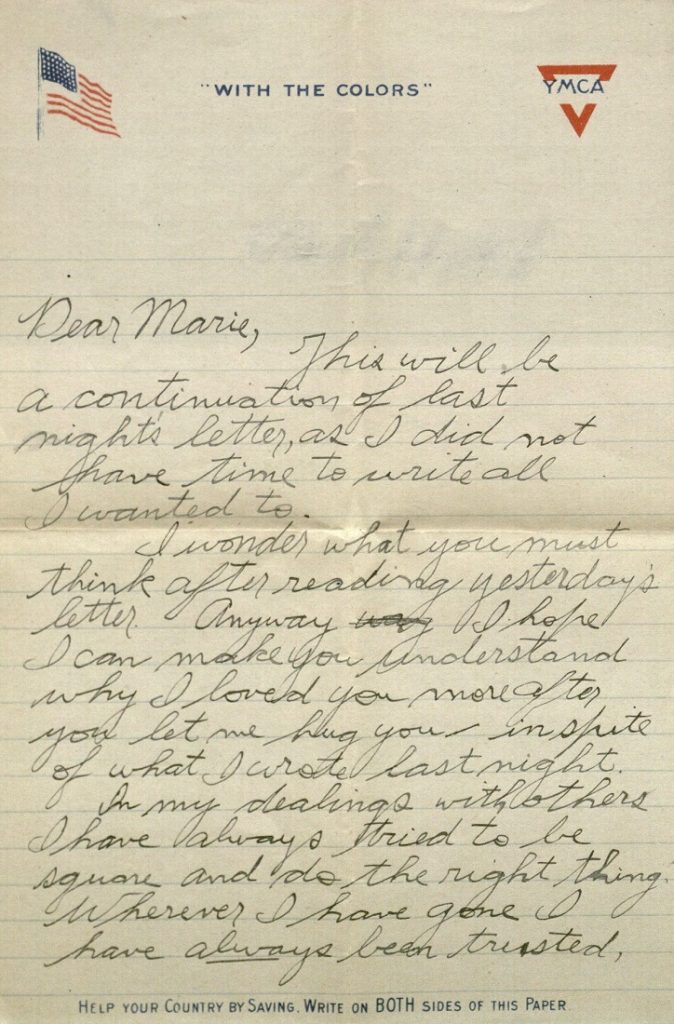
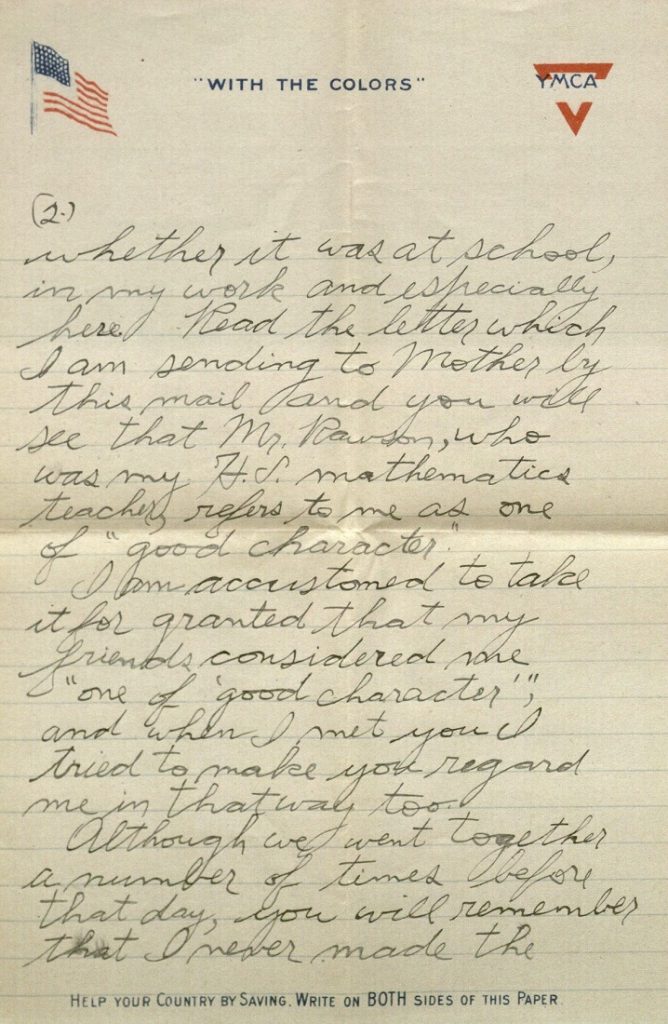
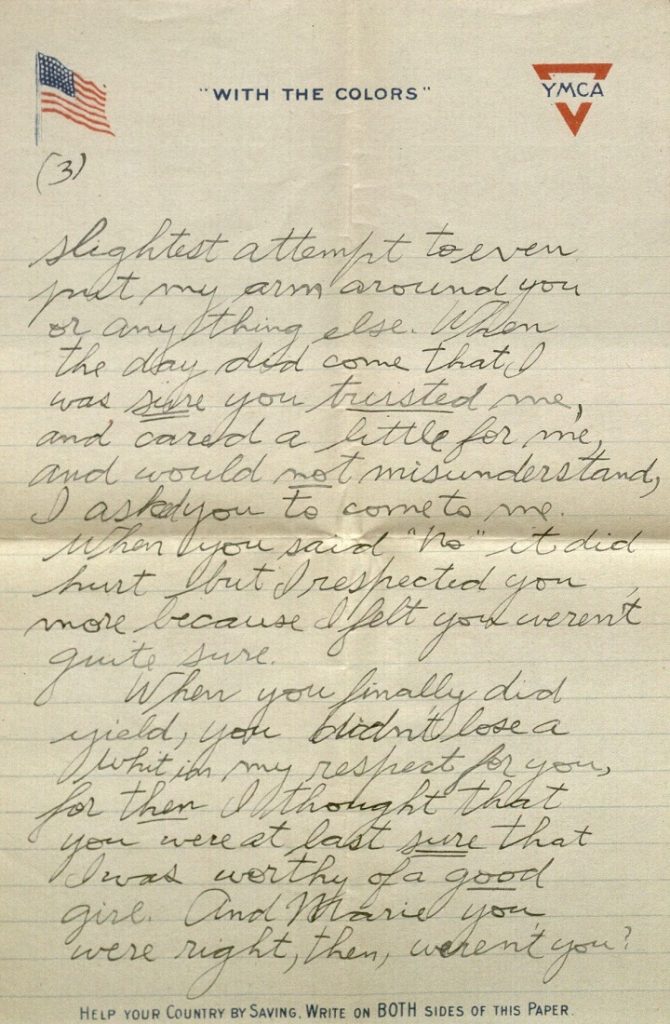
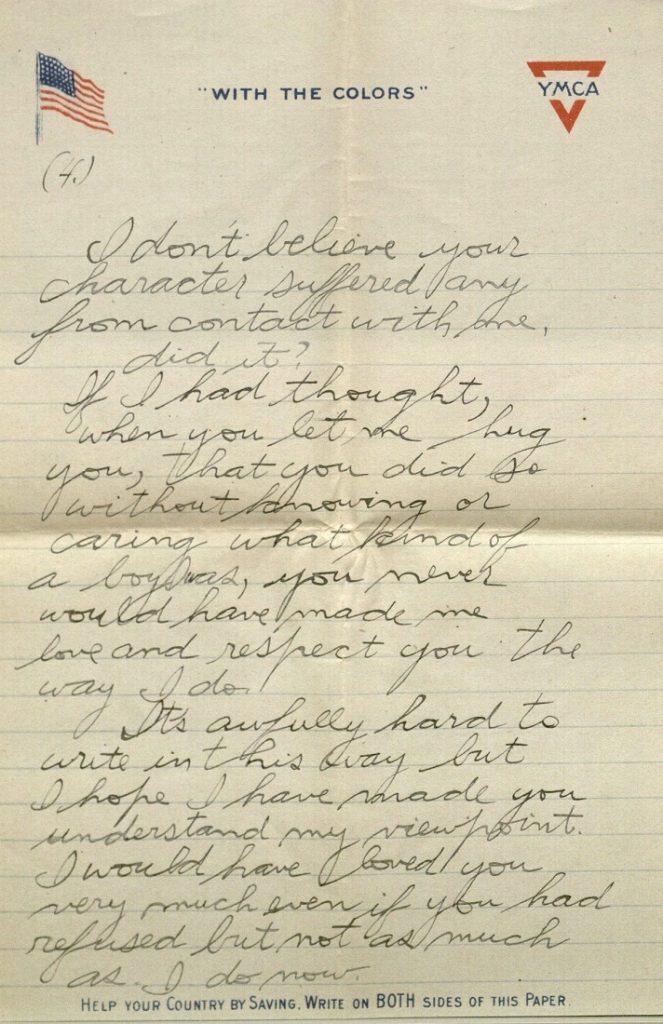
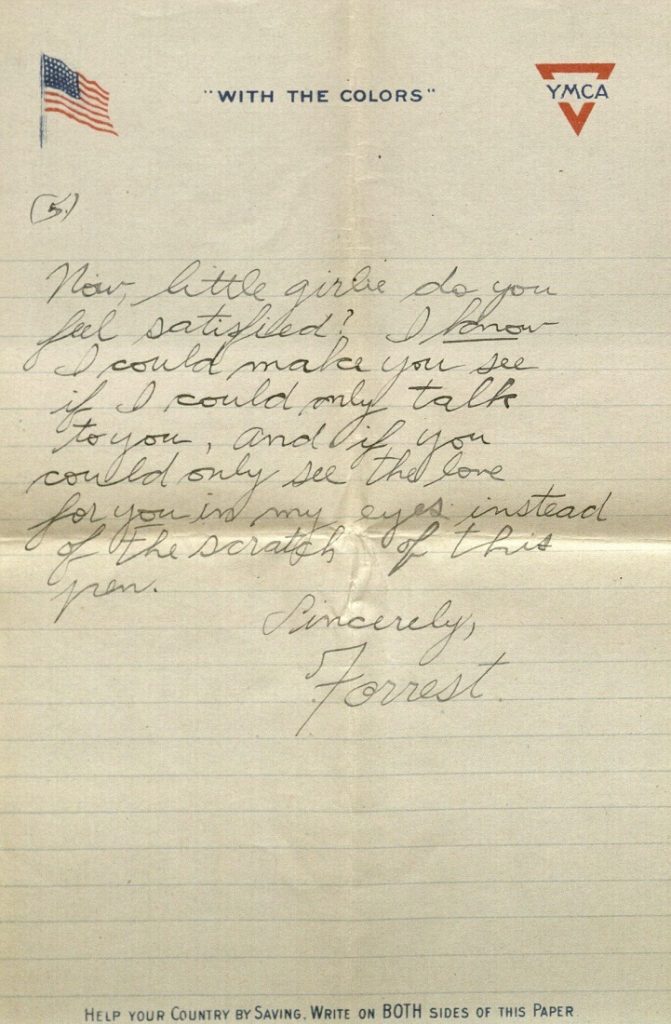
Click images to enlarge.
Dear Marie,
This will be a continuation of last night’s letter, as I did not have time to write all I wanted to.
I wonder what you must think after reading yesterday’s letter. Anyway I hope I can make you understand why I loved you more after you let me hug you in spite of what I wrote last night. In my dealings with others I have always tried to be square and do the right thing. Wherever I have gone I have always been trusted, whether it was at school, in my work and especially here. Read the letter which I am sending to Mother by this mail and you will see that Mr. Rawson, who was my H.S. mathematics teacher, refers to me as one of “good character.”
I am accustomed to take it for granted that my friends considered me “one of ‘good character’,” and when I met you I tried to make you regard me in that way too.
Although we went together a number of times before that day, you will remember that I never made the slightest attempt to even put my arm around you or anything else. When the day did come that I was sure you trusted me, and cared a little for me, and would not misunderstand, I asked you to come to me. When you said “no” it did hurt but I respected you more because I felt you weren’t quite sure.
When you finally did yield, you didn’t lose a whit in my respect for you, for then I thought that you were at last sure that I was worthy of a good girl. And Marie you were right, then, weren’t you? I don’t believe your character suffered any from contact with me, did it? If I had thought, when you let me hug you, that you did so without knowing or caring what kind of a boy I was, you never would have made me love and respect you the way I do.
It’s awfully hard to write in this way but I hope I have made you understand my viewpoint. I would have loved you very much even if you had refused but not as much as I do now. Now, little girlie do you feel satisfied? I know I could make you see if I could only talk to you, and if you could only see the love for you in my eyes instead of the scratch of this pen.
Sincerely,
Forrest.
Sunday Sept. 16, ‘17
Dear Marie,
This has been a very busy week for me and I haven’t been able to write as often as I would like to. I took the visual signal test Thursday and got thru OK. We had to be able to read about 50 letters a minute in semaphore and about 20 letters a minute at wig-wag. It takes an awful lot of practice to develop this speed as it is all new to all of us. I am still plugging along with the fastest class of ham radio operators and can copy about fifteen words or 75 letters a minute. So you see I am also walking on air as they say you are. Don’t feel disappointed at being set back. You have plenty of time and might better take the grade over. I am mighty glad that you are getting along so well. Your mention of the book “Control of Body and Mind,” interested me. Will you tell me more about what you have in this book? Maybe it will help you break yourself of biting your nails. Would you like me to try to help you break this habit?
I am going to cut out all sweet stuff, fudges and everything. But I am anxiously waiting for another box from you. The other box sure was good. Can hardly wait for your pictures to come. Here are a couple proofs of a film I developed last night. One is of Stock and I with the semaphore flags at the first line trenches. The other is of me operating a field buzzer down in a trench by a machine gun emplacement. I will send some prints of these later. I notices the little bronze square on your waiste in the proof you sent, and it sure makes me feel to know that you wear this. It represents the ideal that every man would strive for if he had a girl like you to think of. Gee, girlie, I wish I could feel your head on my shoulder and your soft brown hair in my face. Marie, every time I read your letters I can see you out on the porch that last Tuesday night. Marie don’t change your letters unless you change. I didn’t get any letter today but will watch for one by the first morning mail.
This evening I talked with a man who is training as an engineer lieutenant. I used to work under him part of the time when I was in the City’s employe last fall, surveying. We are going to try to locate Captain Culver, here, this week. This man, Popelka, says the war is going to last a good two years longer. Somebody is always taking the joy out of life. Well I must quit for tonight but will write again as soon as I get the prints. Now will you write me a letter as full of your warm lovable self as your letter of Sept. 13th was?
Yours,
Forrest.
Meredith Huff
Public Services
Emma Piazza
Public Services Student Assistant

